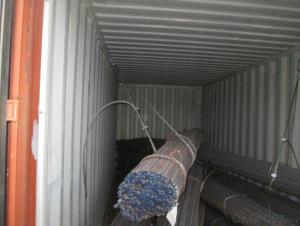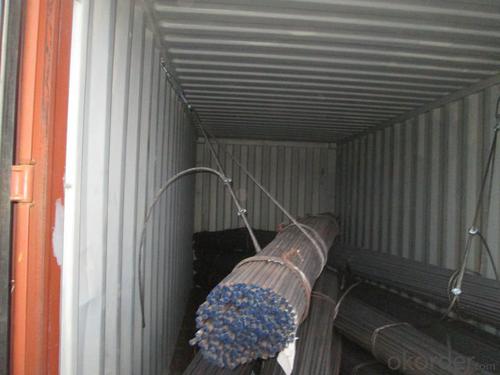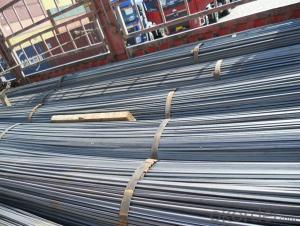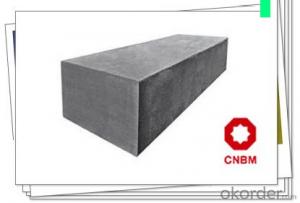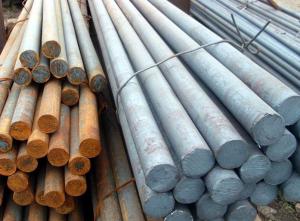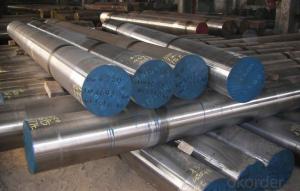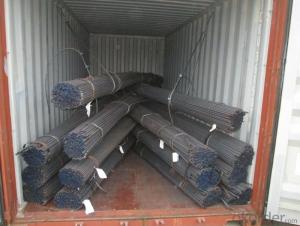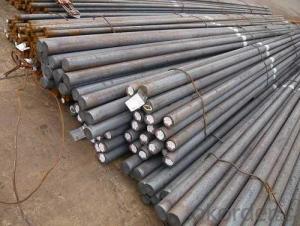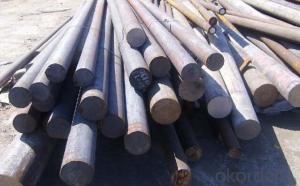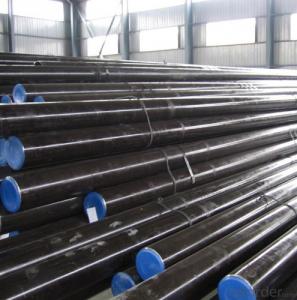Round Bar bearing steel Hot Rolled Product with high quality
- Loading Port:
- Tianjin
- Payment Terms:
- TT or LC
- Min Order Qty:
- 25 m.t.
- Supply Capability:
- 7000 m.t./month
OKorder Service Pledge
OKorder Financial Service
You Might Also Like
OKorder is offering Round Bar bearing steel Hot Rolled Product with high quality steel with worldwide shipping. Our supplier is a world-class manufacturer of steel, with our products utilized the world over. OKorder annually supplies products to European, North American and Asian markets. We provide quotations within 24 hours of receiving an inquiry and guarantee competitive prices.
Product Applications:
Round Bar bearing steel Hot Rolled Product with high quality steel are ideal for structural applications and are widely used in the construction of buildings and bridges, and the manufacturing, petrochemical, and transportation industries.
Product Advantages:
OKorder's Round Bar bearing steel Hot Rolled Product with high quality steel are durable, strong, and resist corrosion.
Main Product Features:
· Premium quality
· Prompt delivery & seaworthy packing (30 days after receiving deposit)
· Corrosion resistance
· Can be recycled and reused
· Mill test certification
· Professional Service
· Competitive pricing
Product Description:
Specifications of Common Steel Round Bar
1. Grade: 304, 316L, 321
2. Type: Mild carbon steel
3. Shape: Round bar, solid bar of steel with circular section
4. Diameter: 8mm-150mm
5. HS Code: 72283010
Usage and Applications of Common Steel Round Bar
1. Common Steel Round Bar of 8-25mm, or small round is mostly used for straight bundles supply, and used for steel, bolts and various mechanical parts. While the bigger round bar, or more than 25mm hot rolled bar, is mainly for the manufacture of mechanical parts or for seamless steel billet.
2. Steel round bar is used in construction and a large number of architectural and engineering structures.
3. Besides, we can supply some especial material steel round bar that can be used for main shaft of steamer, hummer shank, with big section and supper force.
Packaging & Delivery of Common Steel Round Bar
Packaging Detail: All goods are packed in bundle with steel strips and shipped by break bulk vessel or container (depend on target market and different ports)
Delivery Detail: 45 days
Trade terms: FOB, CFR, CIF
MOQ: 25 tons per specification; we can negotiate the quantity if the specification is normal or we have stock of one specification.
Weight: The price invoicing on theoretical weight basis or actual weight basis depends on customer’s request.
Shipment: The shipment of bulk break or container is depends on customer’s request and the situation of the port of destination.
Documents given: Full set of original clean on board bill of lading; Original signed commercial invoice; Original packing list; Policy of insurance; Certificate of origin and what the target market needs.
Production Flow of Common Steel Round Bar
We use advanced equipments like Electric Arc Furnace, Ladle Furnace and Vacuum Degasser to produce our products.
Material prepare (billet) — heat up — rough rolling — precision rolling — cooling — packing — storage and transportation
Characteristics of Common Steel Round Bar
1. The steel in which the main interstitial alloying constituent is carbon in the range of 0.12–2.0%.
2. As the carbon percentage content rises, steel has the ability to become harder and stronger through heat treating; however it becomes less ductile.
3. Quality should be in conformity with the specification of the manufacturer. Quantity and packing conditions should be in conformity with the term in the contract.
4. Regardless of the heat treatment, higher carbon content reduces weld ability. In carbon steels, the higher carbon content lowers the melting point.
FAQ:
Q1: Why buy Materials & Equipment from OKorder.com?
A1: All products offered byOKorder.com are carefully selected from China's most reliable manufacturing enterprises. Through its ISO certifications, OKorder.com adheres to the highest standards and a commitment to supply chain safety and customer satisfaction.
Q2: How do we guarantee the quality of our products?
A2: We have established an advanced quality management system which conducts strict quality tests at every step, from raw materials to the final product. At the same time, we provide extensive follow-up service assurances as required.
Q3: How soon can we receive the product after purchase?
A3: Within three days of placing an order, we will begin production. The specific shipping date is dependent upon international and government factors, but is typically 7 to 10 workdays.
Images:
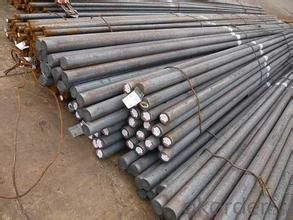
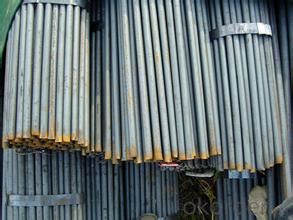
- Q: Are steel round bars suitable for bearing applications?
- In general, steel round bars are suitable for bearing applications. Steel possesses qualities such as strength, durability, and resistance to wear and tear, which make it an ideal material for bearing purposes. Manufacturers often utilize steel round bars in the production of bearings because they have the ability to carry heavy loads and endure rotational forces. Furthermore, steel round bars can undergo heat treatment to increase their hardness and enhance their resistance to friction and corrosion, making them even more suitable for bearing applications. Nevertheless, it is crucial to take into account the specific requirements and conditions of the bearing application to ensure that the chosen steel round bars meet the necessary standards and specifications.
- Q: What are the common finishes for steel round bars?
- There are several common finishes for steel round bars, each offering unique properties and aesthetic appeal. Some of the most common finishes include: 1. Hot Rolled: This finish is achieved by rolling the steel at a high temperature, which creates a rough and scaled surface. It is commonly used for applications where a rough texture is desired, such as structural components or machinery. 2. Cold Rolled: This finish is achieved by rolling the steel at room temperature, resulting in a smoother and more polished surface. It is often used in applications where a clean and precise appearance is required, such as in the automotive or aerospace industries. 3. Turned and Polished: This finish involves machining the steel round bar to achieve a smooth and polished surface. It is typically used for decorative purposes or in applications where a high level of precision is required, such as in the manufacture of shafts or fasteners. 4. Ground: This finish involves grinding the steel round bar to remove any surface imperfections or irregularities. It results in a smooth and uniform surface, making it suitable for applications where tight tolerances or a consistent finish are essential. 5. Coated or Plated: Steel round bars can also be finished with various coatings or platings to enhance their corrosion resistance or aesthetic appeal. Common options include galvanizing, which involves applying a layer of zinc to protect against rust, or chrome plating, which provides a shiny and attractive finish. Ultimately, the choice of finish for a steel round bar depends on the specific requirements of the application, such as the desired appearance, corrosion resistance, or mechanical properties needed.
- Q: Are steel round bars suitable for construction applications?
- Yes, steel round bars are a great option for construction purposes. They are widely utilized in the construction field because of their robustness, longevity, and adaptability. These bars offer exceptional support to structures and are commonly employed in the construction of buildings, bridges, and infrastructure projects. Steel round bars have the ability to endure heavy loads and provide stability, making them suitable for a variety of construction applications. Furthermore, they can be effortlessly manipulated, cut, and joined together through welding to meet specific project requirements. Their resistance to corrosion also makes them ideal for both indoor and outdoor construction projects. Overall, steel round bars are an optimal choice for construction endeavors due to their strength, durability, versatility, and user-friendly nature.
- Q: Can steel round bars be used for making security grilles?
- Yes, steel round bars can be used for making security grilles. The strength and durability of steel make it an excellent choice for security applications, providing protection and ensuring the safety of premises.
- Q: Why do I use the M25 round bar for the embedded bolt M24?
- Because M25 round steel machine processing, the direct use of M24 round steel accuracy is not guaranteed
- Q: What are the different types of steel round bar alloys for improved toughness?
- There are several different types of steel round bar alloys that are known for improved toughness. These alloys are specifically designed to enhance the steel's ability to withstand impact and resist deformation. Some of the commonly used steel round bar alloys for improved toughness include: 1. 4140 Alloy Steel: This alloy is known for its excellent toughness and high tensile strength. It is often used in applications where high impact resistance is required, such as automotive parts, gears, and shafts. 2. 4340 Alloy Steel: Similar to 4140, 4340 alloy steel offers exceptional toughness and strength. It is commonly used in applications where high fatigue resistance is needed, such as aircraft landing gear components and crankshafts. 3. 8620 Alloy Steel: This alloy is ideal for applications that require both toughness and good wear resistance. It is often used in gears, pinions, and other high-stress components. 4. 52100 Alloy Steel: Known for its high toughness and excellent wear resistance, 52100 alloy steel is commonly used in bearings, valve parts, and other heavy-duty applications. 5. H13 Tool Steel: Although primarily used in hot work applications, H13 tool steel is also known for its toughness and ability to withstand high impact loads. It is often used in die casting dies, extrusion dies, and forging dies. 6. A2 Tool Steel: A2 tool steel is another alloy known for its toughness and good wear resistance. It is commonly used in cutting tools, punches, and dies. These are just a few examples of the many different types of steel round bar alloys that are specifically engineered to provide improved toughness. The selection of the appropriate alloy depends on the specific application requirements and the desired level of toughness needed.
- Q: What are the different types of steel round bar finishes for decorative purposes?
- There are several different types of steel round bar finishes that can be used for decorative purposes. Some common options include polished, brushed, hammered, and antique finishes. Each of these finishes provides a unique aesthetic appeal and can be chosen based on the desired look and style for the decorative application.
- Q: Can steel round bars be used in the construction equipment industry?
- In the construction equipment industry, it is common to use steel round bars. These bars are well-known for their strength, durability, and versatility, which makes them suitable for various applications in construction equipment. They can be utilized to produce components like axles, shafts, pins, and fasteners. The robustness of steel round bars guarantees that construction equipment can withstand heavy loads and harsh working conditions. Moreover, steel round bars are easily machinable and weldable, enabling manufacturers to create intricate and customized designs for construction equipment. All in all, due to their exceptional mechanical properties and ability to enhance equipment performance and longevity, steel round bars are extensively employed in the construction equipment industry.
- Q: What are the advantages of using niobium-alloy steel round bars?
- There are several advantages of using niobium-alloy steel round bars. Firstly, niobium improves the strength and toughness of the steel, making it highly durable and resistant to fatigue and wear. Secondly, the alloy's high temperature stability allows for its use in extreme conditions without compromising its structural integrity. Additionally, niobium-alloy steel round bars offer excellent corrosion resistance, making them suitable for applications in harsh environments. Lastly, the alloy's lightweight nature makes it ideal for industries that require strong yet lightweight materials, such as aerospace and automotive sectors.
- Q: What is the maximum nitrogen content allowed for steel round bars?
- The maximum nitrogen content allowed for steel round bars varies depending on the specific steel grade and application requirements. However, in general, the nitrogen content is typically limited to around 0.025-0.035% to maintain the desired mechanical properties and avoid detrimental effects on the material's performance.
Send your message to us
Round Bar bearing steel Hot Rolled Product with high quality
- Loading Port:
- Tianjin
- Payment Terms:
- TT or LC
- Min Order Qty:
- 25 m.t.
- Supply Capability:
- 7000 m.t./month
OKorder Service Pledge
OKorder Financial Service
Similar products
Hot products
Hot Searches
Related keywords
